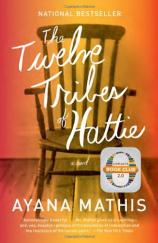The Twelve Tribes of Hattie
Review
The Twelve Tribes of Hattie
Ayana Mathis’s distinctive debut, the latest selection for Oprah’s Book Club 2.0, centers on several generations of an African American family and originates with the trials of a couple just starting out in Philadelphia in the ’20s.
Hattie and August struggle through cold northern winters while attempting to raise and feed a troupe of children over a 40-year period living in a poor neighborhood. They clash vitally, even as they share passion, and fight daily over poverty and poor choices. Hattie’s proud, fiery disposition isn’t helped by August’s simple and thoughtless ways; he is a gambler and womanizer who struggles to find work and is frustrated with his inability to put food on the table. Over the years, life never lets up on them, but it is Hattie’s own choices that haunt her.
"THE TWELVE TRIBES OF HATTIE is a realistic, well-written novel with sound historical appeal, a unique storyline, excellent caricatures, and a wide range of unique storylines and experiences."
When the two first met and fled Georgia, Hattie and August were teenagers and virtually alone, having married because of pregnancy and choosing Philadelphia in hopes of escaping racism and oppression. In the North, their struggles would come in various forms: losing children to ailments and daily troubles, some of these a direct result of poverty and a hard life, beginning with their beloved twins and pneumonia. Later their “losses” would become adult children who succumbed to various emotional troubles, addictions and denial, all seemingly incapable of finding any path toward love or ever feeling settled. Throughout her time as a young mother, Hattie had been unable to forgive her husband for keeping her in a state of helplessness, and these feelings of bitterness would become a perpetual state.
As adults, Hattie’s children crave acceptance and contact from their mother, just as they did when they were kids. They remember an angry and sometimes incompetent mother, but readers are allowed the gift of understanding Hattie more fully and appreciating her many loves and life struggles. She finally settles into a more “comfortable” state as an older woman, seeming to have grown and relaxed a little, even having learned while remaining essentially flawed and abandoning some of her scared outlook. By the end, Hattie remains strong but not always likable as a character, giving the book some quality found in highly engrossing reads even where the material is not always pleasant; Hattie’s presence never does leave readers once Mathis first introduces her.
The storyline here focuses on one family’s difficult issues and choices but is an extraordinary read that will impress readers. From the writing, I was unable to define this as a debut, and each character and point of view proves equally interesting. Individual chapters cover the life and tribulations of a different character, moving from Hattie to her children through history: the ’20s through the ’60s.
Philadelphia and Jubilee were victims of childhood pneumonia. Floyd is a promising young musician struggling with the fact that he’s gay, unwilling or unable to come out while attempting to figure out what he wants. Six is a young man sent away from home for causing trouble who ends up becoming both a religious fraud and a womanizer. Ruthie is Hattie’s daughter from an affair, a baby tended carefully by Hattie even while she neglects the needs of her other children and contemplates leaving her husband. Ella is Hattie’s unexpected child at the ripe age of 46, a baby who Hattie and August were forced to give up because they could not afford to feed or take care of her. Alice is consumed with looking after her brother Billups, who allows it for a time. Franklin is a frightened soldier fighting in Saigon in the ’60s who has already lost his life to alcoholism. Bell has tuberculosis and suicidal ideation and has lost the surety of a given path; Bell’s story reflects most deeply and seriously on the degree of emotional fallout caused by Hattie’s misconduct as a mother. Cassie is a mother who ends up becoming psychotic in adulthood and, because of emotional instability, is forced to leave her daughter in the care of her own parents, who she sees as having vitally failed her.
THE TWELVE TRIBES OF HATTIE is a realistic, well-written novel with sound historical appeal, excellent caricatures, and a wide range of unique storylines and experiences. This is a serious, engaging book that offers much food for thought on family matters and heritage, and the importance of simple understanding among loved ones. Readers of historicals and thoughtful novels should enjoy it and find a great deal to talk about by the end. It also would make an excellent book club pick.
Reviewed by Melanie Smith on January 4, 2013
The Twelve Tribes of Hattie
- Publication Date: October 8, 2013
- Genres: Fiction, Historical Fiction
- Paperback: 320 pages
- Publisher: Vintage
- ISBN-10: 0307949702
- ISBN-13: 9780307949707





